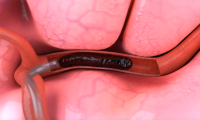-
Alzheimer’s Blood Test Could Soon Replace Invasive Spinal Taps and Brain Scans
- Source: drugdu
- 167
- February 28, 2024
-
Ultra-Sensitive Blood Test Reflects Brain Damage and Predicts Functional Outcomes after Ischemic Stroke
- Source: drugdu
- 164
- February 23, 2024
-
Biogen abandons Aduhelm efforts, focuses on Eisai-partnered Leqembi and pipeline drugs
- Source: drugdu
- 203
- February 2, 2024
-
Pfizer PARP inhibitor Talzenna nabs EU combo nod
- Source: drugdu
- 124
- January 11, 2024
-
GLP-1 agonists can blunt obesity-associated health problems
- Source: drugdu
- 121
- December 18, 2023
-
Discovery of Rogue Protein Paves Way for Diagnostic Test to Detect Early-Onset Dementia
- Source: drugdu
- 92
- December 12, 2023
-
Biogen’s Aduhelm headache returns as appeals court revives part of investor lawsuit
- Source: drugdu
- 134
- October 14, 2023
-
Specific navigational errors may indicate early signs of Alzheimer’s disease
- Source: drugdu
- 120
- October 13, 2023
-
Researchers discover how neurons die in Alzheimer’s disease
- Source: drugdu
- 107
- September 22, 2023
-
Gut problems may be early sign of Parkinson’s disease
- Source: drugdu
- 103
- August 28, 2023
your submission has already been received.
OK
Subscribe
Please enter a valid Email address!
Submit
The most relevant industry news & insight will be sent to you every two weeks.













